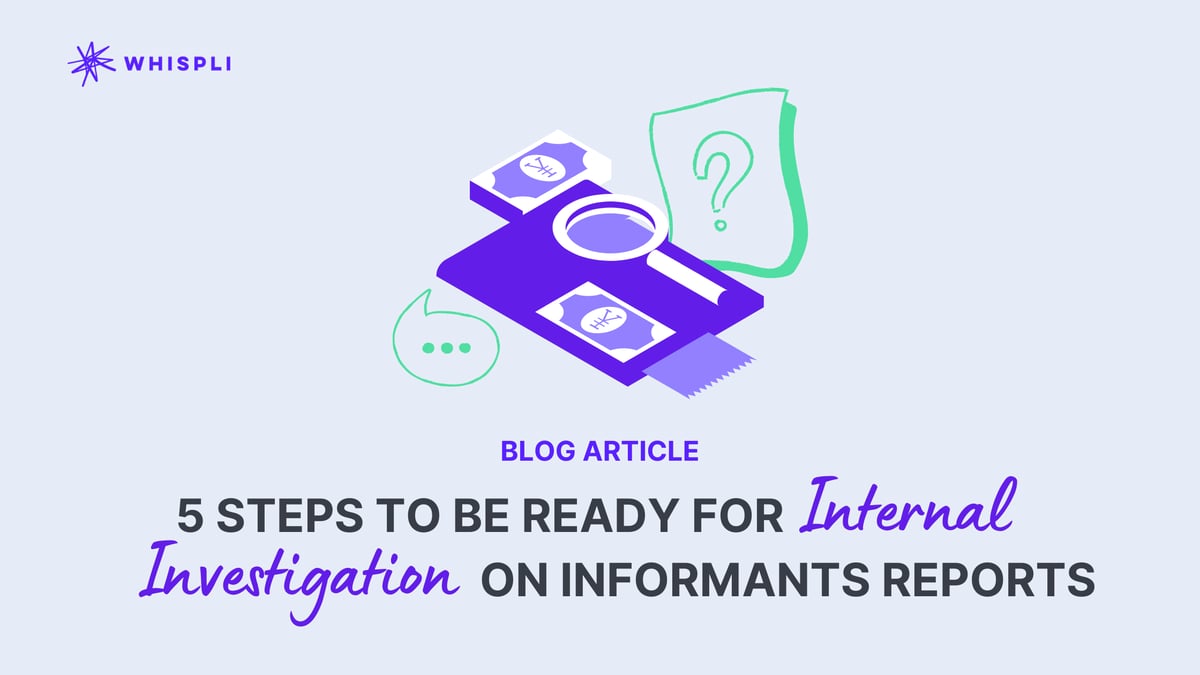5 steps to be ready for internal investigations on informants reports

The main purpose of internal investigations is to uncover wrongdoings within an organisation and, by implementing processes prevent or limit their occurrence. Protecting the organisation from further negative impact.
The steps an organisation takes to proceed with an internal investigation at the time of receiving informants’ reports are crucial and may have a huge impact on the organisation, the employees' retention, and the reputation of that organisation.
An efficient mechanism is important for a company to avoid having employees or related third parties violate any laws and regulations and prevent serious consequences for the organisation and its culture.
A successful internal investigation, relies on the case managers conducting the investigation employing an excellent methodology to gather facts, determine the significance of the complaint or allegation, comply with legal obligations, preserve confidentiality, protect the well-being of individuals and company, take proper and corrective action, avoid liability and avert future assertions.
We have found that in order to get to successful business outcomes from investigations, it is essential to accomplish the following steps:
1. Define who conducts the internal investigation (and when it might change)
- Departments taking the lead are usually: In house- compliance, Human Resources Professionals, in-house counsel, outside Counsel, or a combination of the above.
- The person in charge of the investigation depends on the matter of the facts such as allegations involved, the purpose for which the results will be used (extremely confidentiality for instance), etc
2. Formulate a plan for the investigation
- Build a workflow (Investigation process) if you haven’t already. This will be something that helps the person conducting the investigation work within a structure and standard as assess, investigate, and close out a case. At Whispli, we provide the functionality of Workflows as it helps case managers to apply a systematic process to each investigation they manage, as well as providing them information on the steps they need to take in each investigation.
- For some areas of misconduct or in specific countries or jurisdictions, there are specific processes that need to be followed and Workflows helps you with this.
3. Contact the informant and gather relevant information and documents
- It is vital Case Managers keep communication with informants as they can ensure that the informant is properly supported, they can then develop confidence and credibility that the case he or she has raised is in good hands.
- Ideally, developing a feedback template in advance that can be automatically used is a good strategy in order to respond to reports quickly.
- If a report doesn’t contain sufficient information, try to set an expectation upfront with the informant so that they will know they may need to provide more detailed information on the incident in question. Having a safe inbox as Whispli does, allows the informants and case managers to follow up and send any evidence content at any time in a secure and flexible manner.
- Finally, maintaining communication with the informant by having an easy to use platform trusted by the members of your organization, will improve engagement
4. Keep it Confidential
- It is very important to keep all the information related to a case in a secure space but also treat it carefully and confidentially. Understand where and who has access to this information and ensure controls are in place to limit exposure.
- There can be serious implications for investigations if any information related to a report is leaked or is inadvertently released. This also has a massive impact on the trust you have developed with your employees or informants
- One of the most common reasons that affect people coming forward and employees chosing not to report misconduct, is fear of retaliation. Retaliation weakens employee commitment. Once employees perceive that others are retaliated against for reporting, they will refrain from coming forward when they have concerns. Misconduct that goes unreported can continue, increasing risk, because management is never given the opportunity to address the problem. This is the reason why maintaining supreme confidentiality is extremely important to give the employee great confidence in reporting misconduct without fear.
5. Timing is Critical - Take Appropriate Action … Carefully
- The timing of appropriate action is Critical. DON’T Delay in Taking Prompt, appropriate action
- Consider all remedial options: typically a range of potential actions taking into account proactive vs reactive measures ensuring consistency of remedial actions taken in prior similar situations.
- Taking prompt action from the beginning to the conclusion of the investigation is vital. Automations at Whispli may help the organisation to decide what happens based on the responses from an informant or how a case manager responds during a workflow. You can act quickly on updates, changes, alerts, and activities so the internal investigation will be managed effectively.
In a nutshell, the key of having a great system to conduct internal investigation is primordial and essentially to:
- Develop and maintain a vigorous compliance program
- Act on Information received
- Keep employees engaged and valued
- Deal Effectively with the “Fox in the Hen House”
Whispli accompanies you to have everything mentioned above in a centralized, safe, and flexible place.




